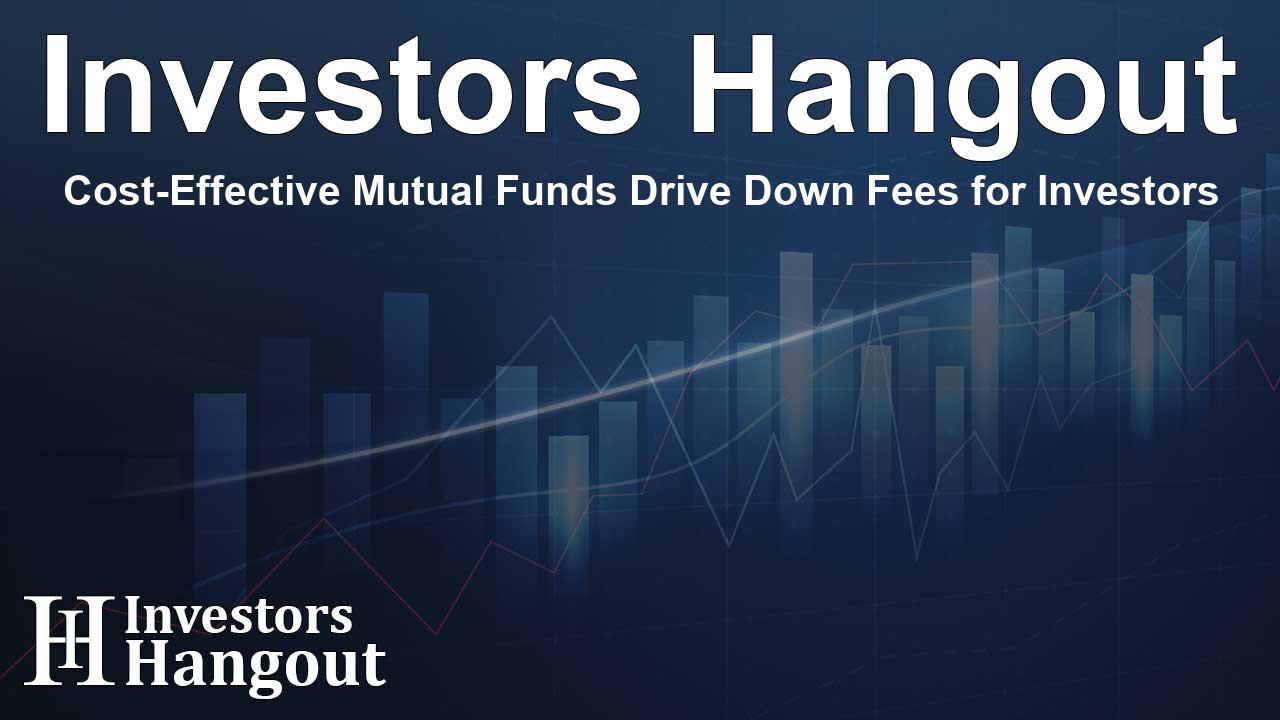Cost-Effective Mutual Funds Drive Down Fees for Investors

Cost-Effective Options Influence Mutual Fund Market
Investors are increasingly drawn to lower-cost mutual funds, leading to a significant drop in average expense ratios according to recent findings. A thorough analysis from the Investment Company Institute reveals that between 1996 and 2024, average expense ratios for equity mutual funds declined by 62%. Similarly, the average expense ratio for bond mutual funds decreased by 55%. This shift in investor behavior showcases a clear preference for no-load funds which do not impose additional sales charges, marking a burgeoning trend in the investment community.
The Impact of No-Load Funds
As retail investors learn about the financial advantages of well-priced investment options, the appeal of no-load funds has grown tremendously. Back in 2000, no-load funds accounted for just 46% of total long-term mutual fund sales. By 2024, that figure swelled to an impressive 92%, highlighting how investors are prioritizing lower fees as a means to maximize their returns. This competitive landscape has encouraged fund managers to innovate by offering more affordable funds.
Recent Trends in Fund Expenses
Recent data sheds light on the evolving cost structure of investment funds. In 2024, the average expense ratio for equity mutual funds fell to 0.40%, down from 0.43% in 2023. While bond mutual funds saw a slight increase to 0.38%, the trend indicates a significant shift towards cost-effectiveness for indexed equity exchange-traded funds (ETFs) as well. Interestingly, the expense ratio for index equity ETFs dropped to 0.14%, while index bond ETFs fell to 0.10%.
Industry Insights on Investor Savings
According to industry experts, these changes have substantial implications for retail investors. Shane Worner, Senior Director of Industry and Financial Analysis at ICI, emphasizes how competitive pricing in mutual funds has enabled significant savings for investors over time. "The focus on providing cost-effective options aligns with the demands of modern investors who seek value without compromising quality."
Key Findings from the Report
The recent report detailing the trends in mutual fund expenses highlights several key findings:
- The average expense ratio for equity mutual funds fell 3 basis points, indicating a commitment to lower costs amidst rising demand.
- Bond mutual funds witnessed a minor increase of 1 basis point as they adapt to market dynamics.
- Index equity ETFs have displayed a favorable drop to 0.14%, encouraging a growing interest from price-sensitive investors.
- Moreover, index bond ETFs have also dropped to a mere 0.10%, further supporting the trend towards low-cost investment vehicles.
The Path Forward for Investors
As we reflect on these findings, it's clear that investors are positioned to benefit from the competitive landscape that encourages lower fees. As fund companies refine their pricing strategies, retail investors should remain vigilant in seeking out the most cost-effective investment solutions that align with their long-term financial goals.
Frequently Asked Questions
What is the average expense ratio for equity mutual funds in 2024?
The average expense ratio for equity mutual funds in 2024 dropped to 0.40% from 0.43% in 2023.
How have no-load funds influenced mutual fund sales?
No-load funds have dramatically increased their market share, rising from 46% of long-term fund sales in 2000 to 92% in 2024.
What changes were noted for bond mutual funds?
The average expense ratio for bond mutual funds increased by 1 basis point to 0.38% in 2024.
What is the expense ratio trend for index equity ETFs?
The average expense ratio for index equity ETFs has declined to 0.14% in 2024, further benefiting investors.
What factors contribute to the decrease in mutual fund fees?
A competitive market, demand for cost-effective options, and the rise of no-load funds are key factors leading to decreased mutual fund fees.
About The Author
Contact Lucas Young privately here. Or send an email with ATTN: Lucas Young as the subject to contact@investorshangout.com.
About Investors Hangout
Investors Hangout is a leading online stock forum for financial discussion and learning, offering a wide range of free tools and resources. It draws in traders of all levels, who exchange market knowledge, investigate trading tactics, and keep an eye on industry developments in real time. Featuring financial articles, stock message boards, quotes, charts, company profiles, and live news updates. Through cooperative learning and a wealth of informational resources, it helps users from novices creating their first portfolios to experts honing their techniques. Join Investors Hangout today: https://investorshangout.com/
The content of this article is based on factual, publicly available information and does not represent legal, financial, or investment advice. Investors Hangout does not offer financial advice, and the author is not a licensed financial advisor. Consult a qualified advisor before making any financial or investment decisions based on this article. This article should not be considered advice to purchase, sell, or hold any securities or other investments. If any of the material provided here is inaccurate, please contact us for corrections.
